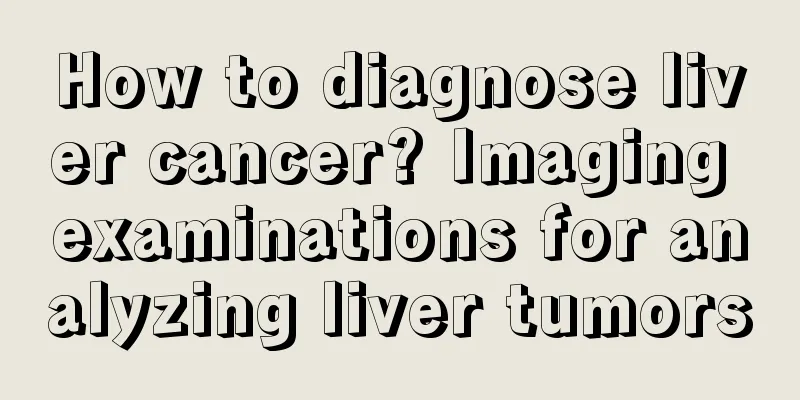How to diagnose liver cancer? Imaging examinations for analyzing liver tumors

|
For liver cancer, experts suggest that early examinations are beneficial for early detection, which can lead to early diagnosis and early treatment. High-risk groups should have regular physical examinations. So how should liver cancer be diagnosed? Some clinical diagnoses are made through symptoms, such as a tumor growing under the liver capsule, swelling the capsule, dull pain in the right muscle ribs of the liver area, poor appetite and fatigue. Patients with hepatitis, cirrhosis and portal hypertension may also have these symptoms, so they are not specific symptoms of liver cancer. Physical signs include lumps: lumps are often found when the tumor grows lower and more superficially, or in the late stage, lumps can be felt. Generally, there are no lumps. Experts point out that patients with a history of chronic hepatitis can use alpha-fetoprotein and modern imaging to diagnose liver cancer. Modern imaging can diagnose 95% of liver cancers. B-ultrasound can diagnose 80-90%. If it is ambiguous, color Doppler ultrasound can be used to see if there is blood flow in the mass. If there is blood flow, it is suspected to be malignant. If there is no blood flow, the possibility of malignancy is low. Magnetic resonance imaging (MRI) can be used to identify certain things that are not very clear, and patients can also be diagnosed early. Angiography, through liver angiography, if there is a tumor, the image will become brighter, but this is traumatic. If the above diagnosis is still not clear, it can be examined by pathology, usually by puncture. However, puncture has many negative effects, such as easy bleeding and easy spread of tumors, so puncture is generally not recommended now. More than 95% of cases can be diagnosed clearly. Imaging studies are particularly recommended for intrahepatic tumors Imaging examinations Hepatobiliary scans are essential diagnostic tests for most liver diseases. They can detect and identify intrahepatic tumors and show lesions in blood vessels and bile ducts. Ultrasound and computed tomography (CT) are most commonly used. Magnetic resonance imaging (MRI) has better contrast clarity than CT and does not require contrast imaging to show blood vessels and bile ducts. Currently, B-ultrasound is widely used in the clinical diagnosis of chronic hepatitis B. However, in fact, most of them are not diagnostic indications, and the results described cannot provide meaningful diagnostic data for hepatitis clinical practice. 1. For most hepatobiliary diseases, ultrasound is the primary imaging examination Cysts and hemangiomas can be diagnosed, but hemangiomas in patients with cirrhosis must be differentiated from hyperechoic liver cancer. CT or MRI is required for identification of space-occupying lesions detected by ultrasound. Further examination methods can be selected after ultrasound examination of obstructive jaundice. In the clinical diagnosis of chronic hepatitis B, B-ultrasound is being widely used, but it cannot actually provide meaningful diagnostic data for hepatitis. Any imaging examination has limited significance for the diagnosis or assessment of hepatitis, and early detection of cirrhosis is mainly based on liver histology. 2. The CT characteristics of cirrhosis are a reduced liver, abnormal proportions of the lobes, an uneven surface, uneven substance, nodules of varying sizes, and an enlarged spleen. HCC is mostly a low-density space-occupying lesion; dynamic enhanced scanning shows a "fast in and fast out" characteristic, with HCC high-density enhancement, venous density reduction, and low density in the delayed phase. MRI is more sensitive and specific than CT enhanced scanning in detecting and identifying malignant lesions. In the detection of small liver nodules in cases of liver cirrhosis, MRI is better than spiral CT, but the detection rate of both for liver cancer <1 cm is less than 40%. The diagnosis rate of small liver cancer with poor differentiation and large size is higher. |
>>: How is liver cancer caused? Five causes of liver cancer that you should know
Recommend
How to avoid sudden death during exercise?
"Sudden death during exercise", as the ...
How to adjust when you are in a bad mood
No one can guarantee that he will be in a good mo...
Do you know how many acupuncture points there are in the human body?
Acupoints are generally used in traditional Chine...
How should lung cancer patients eat? Lung cancer patients should pay attention to these 6 points in their diet
There are more and more types of cancer in societ...
Is bone hyperplasia serious?
Osteophyte is a type of proliferative arthritis, ...
What is uterine cancer? What caused it?
Uterine cancer is one of the gynecological malign...
I feel like something is crawling on my face and it's a bit itchy
If there is really something crawling on your fac...
How many days does it usually take to be discharged from the hospital after liver cancer interventional surgery?
How many days can a patient be discharged from th...
The effect of rabies vaccine and the clinical manifestations of rabies
When it comes to rabies, it should be said that m...
What fruit absorbs fat
Whether you are a man or a woman, you can eat mor...
4 habits that push you toward stomach cancer, but you don’t even know it!
my country has become a high-incidence area for g...
What are the sequelae of rectal cancer
The cruel facts in recent years show that the inc...
Does thyroid cancer cause follicular hyperplasia?
Thyroid cancer is a malignant tumor that originat...
Clinical symptoms of teratoma
Teratoma is a very small tumor that does not caus...
Nursing rounds for metastasis of nasopharyngeal carcinoma after radiotherapy and chemotherapy
Radiotherapy has many side effects, such as mucos...









